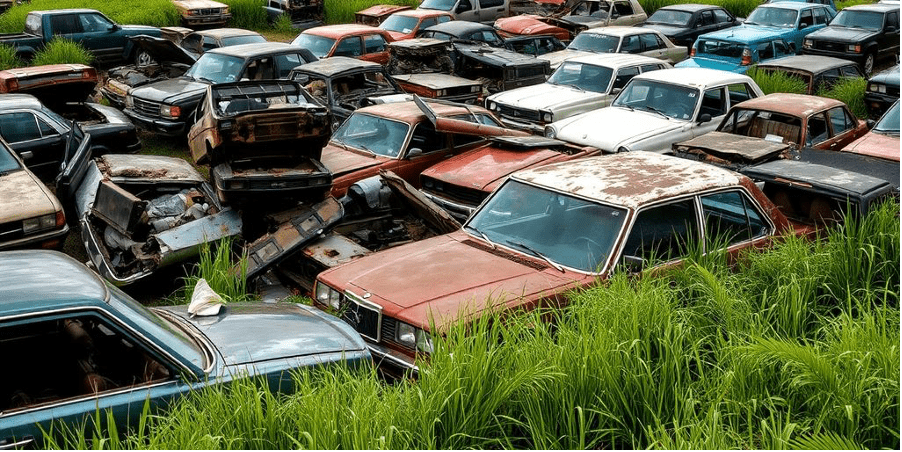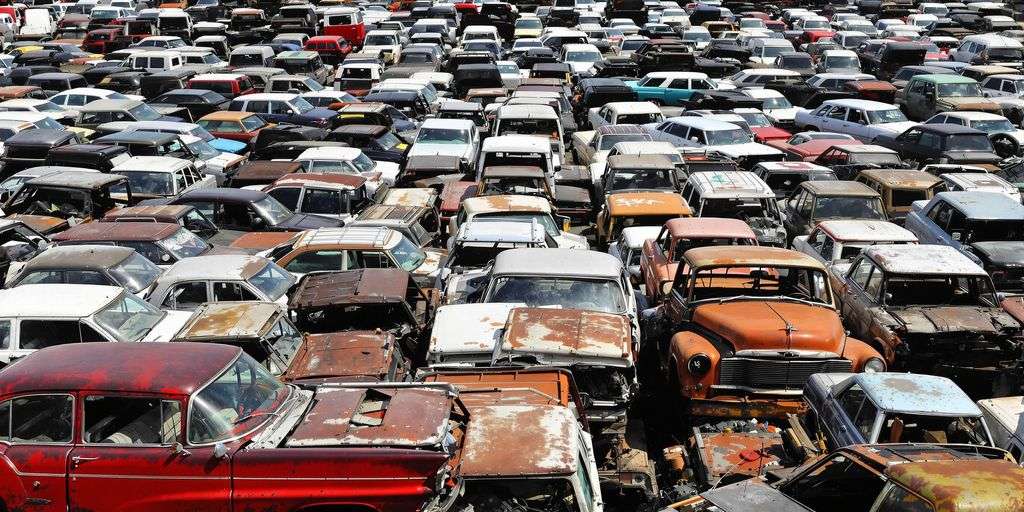Key Takeaways
- Always compare offers from multiple junkyards to ensure you're getting the best price.
- Clean and organize your car before selling; appearances can affect the offer.
- Consider removing and selling valuable parts separately for more profit.
- Check for hidden fees like towing charges that can reduce your payout.
- Research the market to time your sale when scrap metal prices are high.
Understanding the Junkyard Market
Factors Influencing Junkyard Offers
When you're looking to sell your car to a junkyard, it's important to understand what influences the offers you'll receive. Junkyards are businesses, and like any business, their primary goal is to make money. Here's what they consider:
- Salvageable Parts: Parts like engines, transmissions, and body panels can be reused, which increases the car's value.
- Scrap Metal Value: The type and weight of metal in your car determine its worth as scrap.
- Disposal Costs: Safely getting rid of fluids, tires, and other non-recyclables costs money.
- Market Competition: If there are lots of junkyards nearby, they might offer more competitive prices.
Local vs. National Junkyards
Choosing between local and national junkyards can affect how much you get for your car. Local junkyards might offer more because they understand the local demand for parts and can be more flexible with pricing. Plus, they often provide quicker service and payouts. On the other hand, national chains might have set prices but could provide a broader market reach.
Timing Your Sale for Maximum Profit
Just like any market, the junkyard industry has its ups and downs. Scrap metal prices fluctuate, so selling your car when these prices are high can lead to a better payout. Also, consider selling when junkyards need parts more urgently, like before winter or after big storms. Keeping an eye on local trends or asking junkyards about upcoming market changes can help you time your sale right.
Timing is everything. By understanding when the demand is high, you can maximize your profit from selling your junk car.
Preparing Your Car for Sale
Cleaning and Organizing Your Vehicle
Before you even think about selling your car to a junkyard, give it a good clean. It might sound odd to wash a car that's headed for scrap, but it can actually make a difference. A tidy, well-organized car might suggest to buyers that it's been cared for, which could mean a better offer. Here's a simple checklist to get your car ready:
- Remove all personal items: Check every nook and cranny—glove compartments, under seats, trunk.
- Vacuum and wipe down the interior: A clean interior can make the car more appealing.
- Wash the exterior: A quick rinse can make the car look presentable.
Taking a little time to spruce up your car can pay off in the end with a better offer from the junkyard.
Removing Valuable Parts
Junkyards typically value cars based on their scrap metal weight and usable parts. But if you've got aftermarket add-ons like GPS units, custom wheels, or a high-end stereo system, consider taking them out. Selling these separately can put extra cash in your pocket. Just make sure you safely remove them before the junkyard tow truck shows up.
Here's a list of parts that might be worth selling on their own:
- Stereo systems
- Custom wheels
- GPS units
- Premium seats
Gathering Necessary Paperwork
Having all the right paperwork can make selling your car a breeze. Make sure you have the car's title and any maintenance records. The title proves you own the car, which is a big deal for any buyer. If you've lost it, check with your local DMV to get a replacement before you sell. Buyers are often willing to pay more for a car with clear documentation.
- Car's title: Proves ownership.
- Maintenance records: Shows the car's history.
- Any other related documents: Could include receipts for recent repairs or upgrades.
Proper paperwork not only speeds up the sale but can also lead to a higher offer from the junkyard.
Researching Potential Junkyards
Comparing Offers from Multiple Junkyards
When you're looking to sell your car to a junkyard, don't just settle for the first offer you get. It's crucial to shop around and gather quotes from different places. Each junkyard might value your car differently based on what parts they need or how much they can get for scrap metal. Make a list of local junkyards, and don't hesitate to call ones in nearby towns as well. Sometimes, a junkyard a bit further away might offer you more money, making it worth the drive. Keep a detailed list of your car’s details handy, like make, model, year, and any issues it might have. This way, you can provide accurate information and get the most precise offer possible.
Checking for Hidden Fees
Before you agree to sell your car to a junkyard, ask about any potential hidden fees. Some junkyards might charge for towing, while others might offer it for free. Knowing whether you'll need to pay for towing or any other services can help you compare offers more accurately. It's like buying a car; you wouldn't just look at the sticker price without considering taxes and fees. Get all the details upfront, so there are no surprises later.
Evaluating Customer Reviews
Just like you wouldn't book a hotel without checking reviews, the same goes for junkyards. Look up reviews online to see what other sellers have experienced. Are they known for quick cash payouts and hassle-free processes? Or do people complain about low offers and poor service? Reviews can give you insight into what you can expect, helping you avoid any unpleasant surprises. Keep in mind that every business might have a few bad reviews, but if you see a pattern of complaints, it might be best to steer clear.
Selling your car to a junkyard doesn't have to be a stressful experience. By doing your homework and taking the time to compare offers, check for hidden fees, and read customer reviews, you can make sure you get the best deal possible. Remember, it's all about maximizing your return while minimizing hassle.
Negotiating the Best Deal

Understanding Junkyard Pricing Strategies
Junkyards have their own ways of figuring out what they'll pay for a car. They look at the car's weight, the condition of its parts, and current scrap metal prices. Knowing how they price things can give you an edge. If you understand their strategy, you can make a better case for why your car deserves a higher offer.
Leveraging Local Market Knowledge
If you know what local junkyards usually pay, you can negotiate smarter. Check out what other sellers have gotten for similar cars. Local knowledge can be a game changer. It gives you a baseline to work from and helps you spot a lowball offer.
Tips for Successful Negotiation
- Get multiple quotes: Don't just settle for the first offer. Call around and get a few different quotes from various junkyards.
- Be honest about your car's condition: If you're upfront, you're more likely to get a fair offer.
- Highlight valuable parts: If your car has a working engine, transmission, or catalytic converter, mention it. These parts can make your car worth more.
Negotiating isn't just about getting the highest price; it's about understanding the value of what you have and making sure the buyer sees it too. Be patient and persistent, and you'll likely end up with a deal that satisfies both parties.
Exploring Alternative Selling Options
Selling Parts Individually
If you're handy with tools or know someone who is, you might consider dismantling your car and selling its parts separately. This can be a great way to maximize your profit, as individual components often fetch more than the whole vehicle. Catalytic converters, for instance, contain precious metals and can be quite valuable. Here's a quick breakdown of parts that can bring in extra cash:
- Engine and Transmission: These are in high demand and can be sold to mechanics or car enthusiasts.
- Tires and Rims: If in good condition, they can be sold to local tire shops or online.
- Electronics: Items like GPS systems or premium sound systems are always sought after.
Keep in mind, this approach takes time and effort. You'll need to find buyers for each part and handle the logistics of selling and shipping.
Considering Online Junk Car Buyers
Online platforms have made it easier than ever to sell your junk car. Websites dedicated to buying junk cars offer convenience and often competitive pricing. The process is usually straightforward:
- Submit your car's details online.
- Receive an instant quote based on the information provided.
- Arrange for free pickup or delivery of your vehicle.
These services can save you the hassle of dealing with local junkyards and provide a quick way to sell your car without leaving your home.
Weighing the Pros and Cons of Each Option
When deciding how to sell your junk car, consider both the pros and cons of each method:
| Selling Method | Pros | Cons |
| Selling Parts Individually | Higher potential profit | Time-consuming, requires effort |
| Online Junk Car Buyers | Convenient, fast process | May offer less than selling parts |
| Local Junkyards | Immediate cash, no need to dismantle | Possibly lower offers, hidden fees |
Think about what matters most to you. If you're looking for quick cash, a local junkyard or online buyer might be best. But if you're willing to put in the work, selling parts individually could be more profitable. Whatever you choose, make sure it aligns with your goals and capabilities.
Finalizing the Sale

Ensuring a Smooth Transaction
Alright, you've done the hard part. Now it's time to make sure everything goes off without a hitch. Double-check that all your paperwork is in order. This includes the car's title, any maintenance records, and your ID. If you're missing the title, don't panic—head to your local DMV to sort out a replacement. Having everything ready will make the transaction much smoother.
Handling Payment and Transfer of Ownership
When it comes to payment, always insist on cash or a certified check. Avoid wire transfers or personal checks to dodge any potential scams. Once you’ve got the payment sorted, sign over the title to the buyer. Don't forget to remove the license plates before handing over the keys. This step is crucial for canceling your registration and insurance.
Post-Sale Considerations
After the sale, there are a few loose ends to tie up. Cancel the car insurance immediately to avoid unnecessary payments. Also, notify your local DMV about the sale to officially transfer ownership. This will save you from any future liabilities. Finally, consider other ways to profit from an old vehicle, like creative ways to profit from an old vehicle in New York, if you're in the area. This might include parting it out or donating it for a tax deduction.
Selling your car to a junkyard doesn’t have to be a headache. With the right preparation and a bit of negotiation, you can walk away with a deal that works for you. Just remember, a little effort now can save a lot of hassle later.
Conclusion
Alright, so there you have it. Selling your junk car doesn't have to be a headache. Just remember to do your homework. Check out a few local junkyards, and don't be shy about asking questions. Make sure you know what your car's worth, and don't settle for the first offer you get. Timing can be everything, so keep an eye on scrap metal prices. And hey, if you're up for it, selling some parts separately might just put a little extra cash in your pocket. At the end of the day, it's all about getting the best deal you can. So go ahead, make that call, and turn that old clunker into some cash.
Frequently Asked Questions
How do I find the best junkyard to sell my car?
Start by researching local and national junkyards online. Compare their offers and read customer reviews to see what others say about their experiences. Don't forget to contact them directly to ask any questions you might have.
What should I do before selling my car to a junkyard?
Clean your car, remove personal items, and take out any valuable parts you might want to sell separately. Gather all necessary paperwork like the title and registration to make the sale smoother.
How can I get the most money for my junk car?
To maximize your profit, get quotes from multiple junkyards, consider selling valuable parts separately, and choose the right time to sell based on scrap metal prices. Being honest about your car's condition can also lead to better offers.
Are there any hidden fees when selling to a junkyard?
Some junkyards might charge for towing or other services, so it's important to ask about any potential fees upfront. Look for junkyards that offer free towing and transparent pricing.
Is it better to sell my car to a local or national junkyard?
Local junkyards might offer more personalized service and quicker payouts, while national junkyards could provide more competitive rates. Weigh the pros and cons of each option based on your needs.
What are alternative options to selling my car to a junkyard?
You can consider selling parts individually, using online junk car buyers, or even donating your car. Each option has its own set of benefits and drawbacks, so consider what works best for you.



